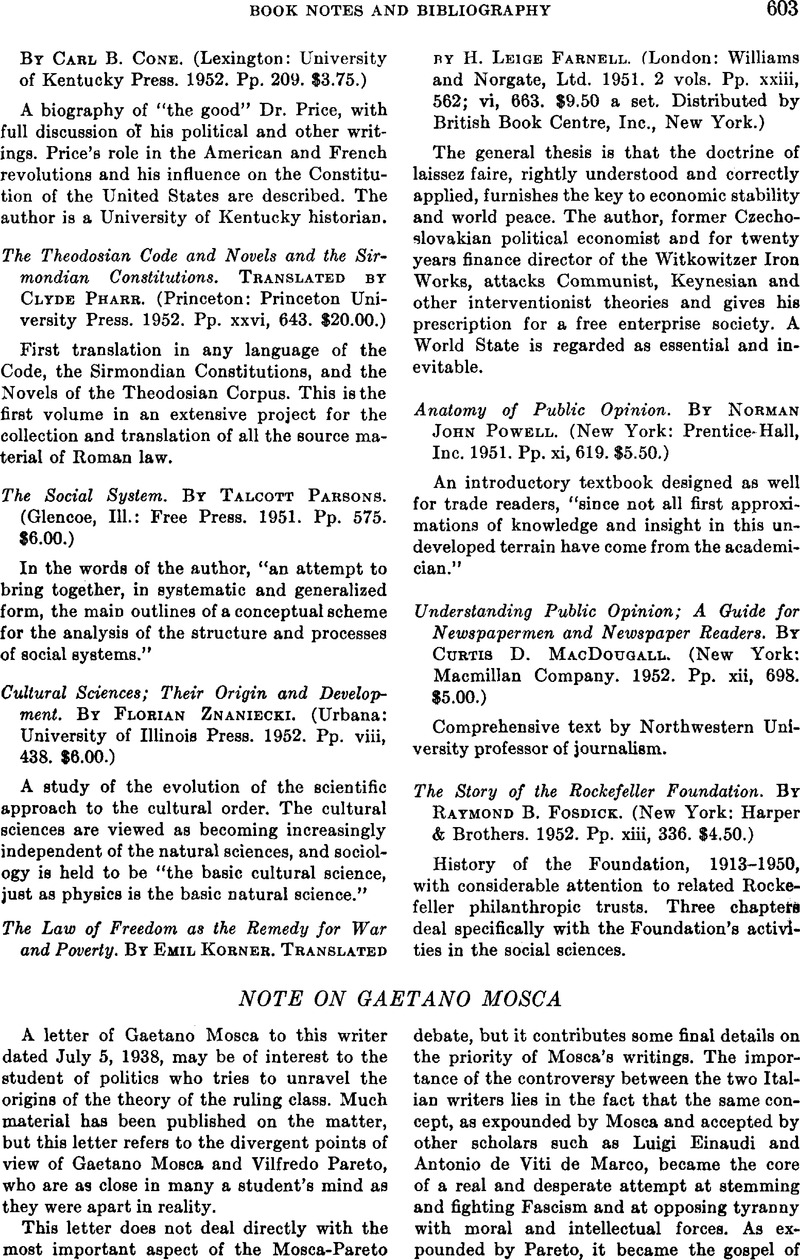Article contents
Note on Gaetano Mosca
Published online by Cambridge University Press: 02 September 2013
Abstract

- Type
- Book Notes and Bibliography
- Information
- Copyright
- Copyright © American Political Science Association 1952
References
1 Mosca was almost a forgotten man under the Fascist regime. He was remembered only as a useful target of totalitarian rhetoric. While intellectually a rigid positivist, wholly devoid of philosophical or moralizing themes, he was above all a moralist. His opposition to socialism was based not merely on scientific but on moral grounds. (Cf. “Risposta ad un' inchiesta sul socialismo”, Bios, Vol. 1 [1902–1903].Google Scholar) His opposition to the Fascist regime was also both intellectual and moral. He had the opportunity to state his views in the Senate of the Kingdom in a speech explaining his vote opposing the grant of full powers to the Prime Minister, Benito Mussolini. The speech was at the same time the declaration of faith of a liberal and of the way of life of a true gentleman. It is reprinted in a collection of Mosca's essays and speeches, Partiti e sindacati nella crisi del regime parlamentare (Bari, 1949)Google Scholar.
2 Sereno, Renzo, “The Anti-Aristotelianism of Gaetano Mosca and Its Fate”, Ethics, Vol. 48, pp. 509–518 (July, 1938)CrossRefGoogle Scholar.
3 A detailed bibliography of Gaetano Mosca has been published by Piane, Mario delle, Bibliografia di Gaetano Mosca (Siena, 1949)Google Scholar.
4 The Storia delle dottrine politiche was published again by Laterza, Bari, in 1937, and republished in 1939, 1942, and 1945Google Scholar.
5 The Elementi has been published in English as The Ruling Class (edited by Livingstone, Arthur, New York, 1938)Google Scholar. Senator Mosca in a letter to this writer dated December 28, 1937, dealing inter alia with the American edition of his work, sent thanks to Professors Borgese, Mario Einaudi, Merriam and Lasswell for their interest in the diffusion of his thought. The Elementi was published once more in 1939 by Laterza, BariGoogle Scholar, and republished in 1947 with an introductory essay by Benedetto Croce. On the revival of Mosca's theories after the demise of Fascism, cf. Pepe, Gabriele, “Gaetano Mosca”, Belfagor, Vol. 5, No. 1, pp. 42–66 (Jan., 1950)Google Scholar.
6 The article “Piccola polemica” here mentioned has been republished in Partiti e sindacati, etc., quoted above in n. 1.
7 Einaudi, Luigi, “Dove si discorre di Pareto, di Mosca e anche di de Viti”, Riforma sociale, Vol. 45 (Nov.–Dec. 1935)Google Scholar.
8 On the development and meaning of the term èlite, cf. Sereno, p. 515, n. 15.
9 Mosca was keenly interested in American political thought, much more so than most continental scholars of his time. He was familiar not only with the writers of the Revolutionary period but with the juridical ways and problems of the United States. He was greatly pleased with C. E. Merriam's American Political Theories and American Political Ideas and was extremely interested in the approach of Harold Lasswell, which appealed to him because it involved social disciplines and points which he deemed most important to the development of a study of politics—psychology and positive scientific systems. He was also aware of the gap separating political thought and political practices in the United States, which he had learned through the works of Bryce, Ostrogorski and Benoist (the writings of the latter, particularly Les maladies de la démocracie, he deemed pointless). Finer, Herman, in Mussolini's Italy [1935]Google Scholar presents a highly inaccurate picture of Mosca.
Among the Americans who understood Mosca only partially is James Burnham, who wrote a long chapter about him in his The Machiavellians. Mosca cannot be considered a Machiavellian either in the vulgar, or indeed in any other, meaning of the term. Mosca greatly admired the Florentine's clear mind and direct style, but considered him unpractical and unscientific. He was more interested in Guicciardini, who, though a far less gifted writer and thinker than Machiavelli, had in common with Mosca spregiudi catezza, the gift of looking at old and current problems as if judgments thereupon had never been formulated. Burnham makes no mention of the Machiavellian writings of Mosca. (“Encore quelques mots sur le Prince de Machiavelli”, Revue de sciences politiques, Vol. 48, pp. 481–509 (1925), and Vol. 49 pp. 5–27 1926Google Scholar; published in Italian in the collection πολιτέια [Roma, 1927]Google Scholar, under the title “Il Principe di Machiavelli quattro secoli dopo la morte del suo autore.” Cf. also the chapters on Machiavelli, Guicciardini and the Practical Machiavellians in the Storia delle dottrine politiche [fifth Italian ed., Bari, 1945], pp. 107–139.Google Scholar)
- 3
- Cited by





Comments
No Comments have been published for this article.